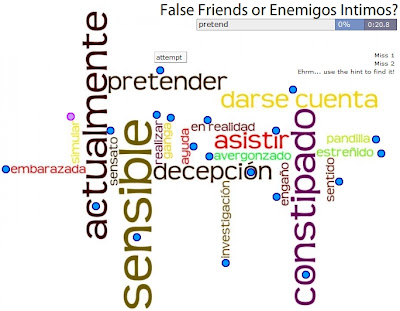When we are learning a language, we tend to, quite naturally, use familiar-sounding words in a context which we subconciously assume to be correct. This often happens with languages with the same roots like Latin, for example. As we know, many English words are derived from Latin, which is the main source for languages such as French, Italian, Portuguese and Spanish.
Some words, indeed, have similar meanings, but there are many that don't, which can result in rather embarrassing situations.
A Spanish or Portuguese, for example, may say, 'I pretend to assist you in your class', which will find a non-Latin-speaking English teacher responding with a blank stare.
Words like these are known as false cognates, or more commonly, false friends or 'amigos falsos'.
Below are some common examples of Spanish false friends.
actual (SP: present, current; ENG: used to emphasise that something is real, which leads to another false friend as 'real' in Spanish means 'royal'!)
asistir (SP: to attend; ENG: assist = to help)
constipación (SP: a cold; ENG: constipated = have trouble going to the loo, 'estreñido')
decepción (SP: disappointment; ENG: deception = trickery)
dormitorio (SP: bedroom; ENG: a large room where a lot of people sleep)
embarazada (SP: to be pregnant; ENG: embarrassed = ashamed)
en absoluto (SP: not at all; ENG: absolutely = completely)
éxito (SP: success; ENG: exit = way out)
ganga (SP: bargain; ENG: gang = 'pandilla')
historia (although it also means 'history', it is often used to mean 'story', as in 'historia de amor')
investigación (in Spanish, it is also used to mean 'research'; in English, we normally investigate such things as crime and accidents)
librería (SP: bookshop. A library is 'biblioteca' in Spanish. A newsagent or a corner shop can be known as 'estanco')
preservativo (SP: contraceptive; ENG: preservative = 'conservante', and conservative = 'conservador')
pretender (SP: to try; ENG: pretend = fake, 'fingir', 'simular')
realizar (SP: to carry out; ENG: realise = to know and understand, 'darse cuenta')
régimen (In hotels, it is used to refer the type of meal arrangement (board): alojamiento y desayuno = bed and breakfast; media pensión = half board; pensión completa = full board. In English, we used regimen to mean a programme of medical treatment, exercise, or special food for improving your health or appearance. So, a hotel receptionist wouldn't say, 'What type of regimen would you like?')
sensible (SP: sensitive; ENG: reasonable and practical. Sensible in English would mean 'sensato' , 'prudente' or 'razonable')
Click on the image above to play a point-and-click game. Feedback would be most welcome.
If you like this, you may like this one, too: False Friends II
Click on the image above to play a point-and-click game. Feedback would be most welcome.
If you like this, you may like this one, too: False Friends II


Just spent 3 weeks in a trilingual household (English, Spanish, Mandarin). Sadly I am fluent only in English, but am very interested in linguistics, including cognates & false cognates.
ReplyDeleteI look forward to more exchange of ideas.
Walker - aka slaaty @ PG
Stay tuned in then, Walker! Glad to have you on board!
ReplyDeleteJust spent 3 weeks in a trilingual household (English, Spanish, Mandarin). Sadly I am fluent only in English, but am very interested in linguistics, including cognates & false cognates.
ReplyDeleteI look forward to more exchange of ideas.
Walker - aka slaaty @ PG